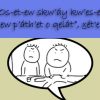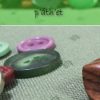Li chexw we we éyò? means ‘Are you well?‘ or ‘Are you doing good?‘ It is a standard way of greeting someone.


Li chexw we we éyò? means ‘Are you well?‘ or ‘Are you doing good?‘ It is a standard way of greeting someone.

Chexw is one way of saying ‘you‘ in the language.

Li chexw … means ‘Are you…?‘. In some contexts, it would translate as ‘Did you…?‘.

Eyò means ‘doing good’ or ‘doing well’
![Illustration for li - [yes/no question marker]](https://old.stoloshxweli.org/wp-content/uploads/2017/09/yes-no-100x100.jpg)
Li does not directly translate into English, but is used to mark the equivalent of ‘yes/no’ questions.

“‘Osetew skw’áy kw’eset ew p’áth’et o qelát”, x̲ét’e. means “‘We just couldn’t sew it (up) again”, (he) said .

Qelát means ‘again’.

Skw’áy kw’eset p’áth’et means ‘we can’t sew (it)‘ or ‘we couldn’t sew (it)’.

Skw’áy kw’es p’áth’et is a partial (incomplete) phrase, you could translated as ‘can’t sew‘ or ‘couldn’t sew’, depending on context.

P’áth’et means ‘to sew‘.
